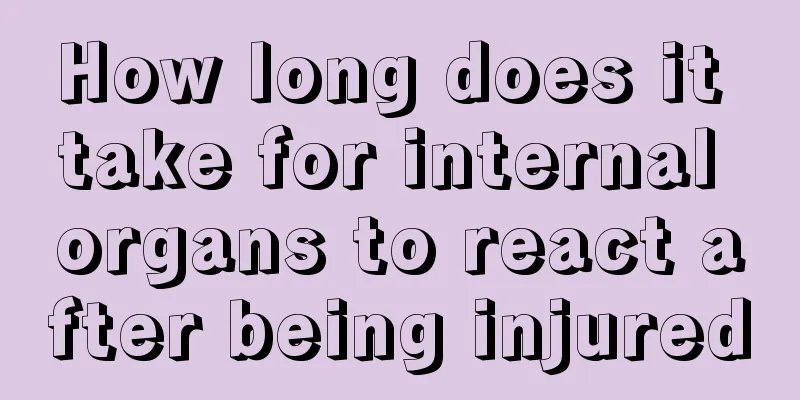How long does it take for internal organs to react after being injured

|
The harm caused by internal organ injury is relatively large, and it can cause a variety of symptoms. The most obvious is chest pain, which can cause coughing and abdominal pain. More serious cases can cause low blood pressure and cause stronger toothache or rebound pain. If there is damage and harm to the lower gastrointestinal tract, it can easily cause perforation. At this time, first aid methods must be taken to treat it. Let us learn about it. How long does it take for internal organs to react after being injured? Chest pain, cough, abdominal pain, low blood pressure. When the stomach, duodenum or upper jejunum is damaged, the leaked digestive juice (including gastric juice, pancreatic juice and bile) produces strong chemical stimulation to the peritoneum, immediately causing severe pain, and typical peritonitis manifestations such as abdominal muscle tension, tenderness, rebound tenderness, etc. When the lower gastrointestinal tract ruptures, the chemical irritation caused by the leaked material is milder, and the signs of peritonitis appear later and are less severe. Whether it is rupture or perforation of the upper or lower gastrointestinal tract organs, it will eventually cause bacterial peritonitis, but the bacterial contamination caused by rupture or perforation of the lower gastrointestinal tract organs is far more serious than that of rupture or perforation of the upper gastrointestinal tract. As peritonitis progresses, abdominal distension gradually appears due to intestinal paralysis, and in severe cases, septic shock may occur. After the rupture of a hollow organ, there may be free gas in the abdominal cavity, causing the boundary of hepatic dullness to shrink or disappear. In addition, injuries to the stomach and posterior duodenum may cause vomiting of blood, and injuries to the rectum often result in bright red bloody stools. Patients with retroperitoneal duodenal rupture may sometimes present with symptoms and signs such as testicular pain, scrotal hematoma, and priapism. Multiple injuries If both solid and hollow organs rupture at the same time, clinical manifestations of hemorrhage and peritonitis may occur simultaneously. The clinical manifestations of multiple injuries are more complicated. For example, patients with severe craniocerebral injuries may experience impaired consciousness. Symptoms of chest injuries, spinal or pelvic fractures are often obvious and may mask the manifestations of abdominal injuries, which should be paid attention to. |
<<: Feeling something at the base of tongue
>>: Distribution of human internal organs
Recommend
Can kidney cancer metastasize to the liver be transmitted to others?
Can kidney cancer metastasize to the liver be tra...
Can I drink milk if I have protein in my urine?
Urine is mainly some unnecessary fluid excreted f...
Nursing of patients with endometrial cancer
Patients with endometrial cancer often know too l...
Does Feizixiao lychee cause internal heat?
We know that Feizishao lychees are a hot food. If...
There are small pimples around the lips
Everyone's skin is different and produces dif...
How to use the scalp massage brush
I believe everyone has heard of scalp massage, bu...
What to do if the tongue is crooked due to nasopharyngeal cancer
This problem is likely related to nerve factors, ...
What is Qi and Blood Stasis
Even though Western medicine has developed into m...
What is painless colonoscopy
Since the process of colonoscopy is painful, many...
What should I do if I have a mouth full of oral ulcers? Do these things well
Oral ulcers, also known as mouth sores, are an ul...
How long can one live with nasopharyngeal carcinoma metastasis and can it be cured?
When cancer cells develop to the late stage, they...
How to whiten your arms quickly
In summer, many female friends don’t like going o...
Is sperm good for your skin?
There are some rumors in life now that sperm is g...
What are the early symptoms of breast cancer
In the early stages of breast cancer, there is no...
Does mint have the effect of weight loss? How effective is it?
For girls who are losing weight, it is very good ...









